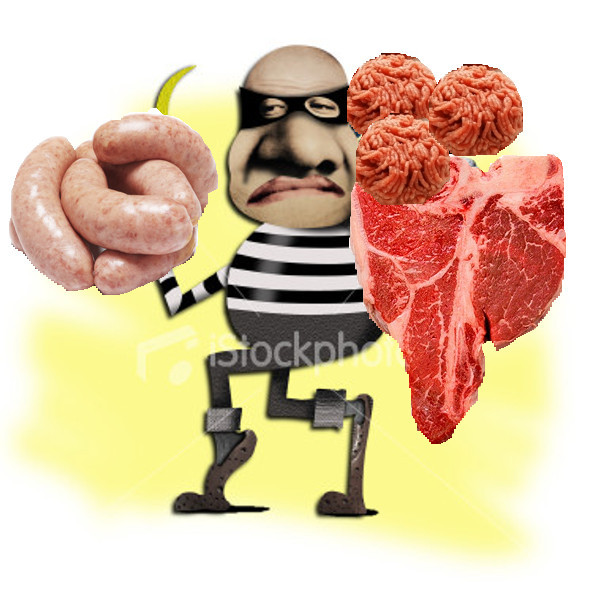Elizabeth Weise of USA Today writes today that with food prices escalating, meat thieves — organized groups who target steaks and high-end cuts at supermarkets for resale to unscrupulous restaurants and markets — are a growing problem. They’re also hitting meat lockers, cattle pens and even 18-wheelers.
In a comprehensive follow-up to the July 29/11 arrest of six men in Austin, Texas, Weise explains how police officers took fresh meat to more than 28 area restaurants to offer for sale. It wasn’t an easy sting to carry out because unlike the thieves, they had to abide by food safety regulations. "The meat had to be kept under 41 degrees, so we didn’t have much time to work," says Sgt. David Socha, who took part in the investigation.
None of the 25 restaurants chosen at random would touch the meat brought to their back doors and offered at half off, but the three restaurants who’d been fingered by the shoplifters "bought it again and again and  again," Socha says. It wasn’t just staff looking to make money on the side, but management who were involved, "so we knew it wasn’t a fluke," he says.
again," Socha says. It wasn’t just staff looking to make money on the side, but management who were involved, "so we knew it wasn’t a fluke," he says.
After each restaurant had bought more than $1,500 worth of stolen meat, making it a felony, police moved in and made arrests July 28.
This sort of organized retail crime is a common and growing problem, says Joseph LaRocca, who focuses on asset protection for the National Retail Federation. A recent poll by the group found 95% of retailers falling victim to it in 2010, up from 89% in 2009. More than two-thirds of members say "these groups are getting more brazen and they’re getting hit harder," LaRocca says.
Organized retail crime rings consist of professional shoplifters, called boosters, who take "orders" from fences who buy the pilfered product. "Their entire job is to go out and steal. It seems that they stay within their realm — meat thieves will steal meat," says officer Scott Stanley of the Tacoma, Wash., Police Department. Stanley is also the founder of the Washington State Organized Retail Crime Alliance.
In his experience, most of the boosters are drug addicts. Many are even paid in drugs. "They say ‘You go out and steal me $150 in tri-tip (roasts), and I’ll give you enough crack for a week," he says.
The meat gets sold to unscrupulous restaurants or out of the back of a van at swap meets. Sometimes it goes to mom-and-pop convenience stores. "We’ve gone into a Shell (gas) station and found steaks with the Safeway sticker still on them," Stanley says.
"The lack of refrigeration is a serious food safety concern; so is the suspect handling," says Douglas Powell, a professor of food safety at Kansas State University in Manhattan, Kan. "And if restaurant owners are willing to cut corners and buy street meat, what else are they cutting corners on in the back kitchen? It doesn’t inspire confidence."
The organizations aren’t all small-scale. Thieves made off with $11,000 worth of meat from Sedlacek’s .jpeg) Wholesale Meat Co. in Melbourne, Iowa, in February.
Wholesale Meat Co. in Melbourne, Iowa, in February.
Owner Barry Sedlacek came in one morning to find his cooler door open and 2,500 pounds of top-quality meat missing.
Texas has already had between 700 and 800 cattle rustling cases this year, says Larry Gray, law enforcement officer for the Texas and Southwestern Cattle Raisers Association in Fort Worth. "There’s been an uptick in cattle thefts, first because of the economy and also because cattle prices are so high," he says.
An 800-pound steer is worth about $880 right now, he says. Thieves will pull up to a feeding pen, load up their truck and "be out of there in 10, 15 minutes," Gray says. They sell them at livestock auctions for quick cash.

